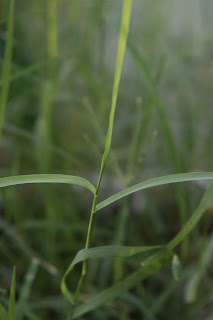Drubha - Not Just Mere Grass
This is mere grass to us all, widely spread world wide and the unassuming component of soft lawns.
Interestingly this simple long leaved plant with parallel venetaion is medicinal. It has mentions in our Vedas, and is an essential ingredient in Pujas and Yagnas; no wonder it is also called Anantha and Shataparvika.
Also called Bermuda grass, and Durva in Sanskrit, the green of Durbha is a treat to tired eyes and is speculated to alleviate stress.
All images are from my Terrace garden, grown organically on compost from wet waste from our kitchen
Growing, Propagation and Care: Durbha is usually found growing wild in most gardens, grasslands and farms. Its a very non-fussy plant to grow and propagate. The plant can be plucked up by its roots from soil and transplanted. Roots are fibrous, and grow to about one foot deep into soil. Transplantation shock is minimal, and can even survive dryness for 3-4 days. Uprooted durbha can be placed in water for a couple of days before planting in soil in ground or pot.
An extremely sturdy plant, it spreads easily horizontally, rooting at each node if conducive environment prevails, and hence minimum care is needed besides regular watering. This plant can become a weed and trouble by using up nutrition in soil if not kept under control. Regular trimming promotes denser growth.
Medicinal Properties: Durbha is a cooling agent; it has a cooling effect on the body. Durbha has almost 10% protein, it also has Soduim, Potassium, Calcium, and Magnesium.
It's useful in cough and disorders of pancreas. Its good for promoting clotting.
Uses:
*Young Durbha leaves are sweet and very refreshing.
10 ml juice made from a handful Durbha with half a cup water ground and
strained well is an excellent drink for energy; this juice is an essential
ingredient in naturopathy treatment. It is best drunk first thing in the
morning after morning ablutions.
*Durbha is known to be good for alleviating bleeding in general.
For bleeding through the nose in children, esp during summer, nasyam or neti (where
typically lukewarm water is poured from one nostril and allowed to flow out of
the other nostril. Please learn the procedure from a Vaidyan or Ayruvedic
Doctor before performing neti) can be performed with a solution made using
powdered shade-dried Durbha mixed well in warm water.
*Durbha is also useful against Dengue in enhancing platelet count. Grind a handful of
durbha leaves with Papaya leaves and 2-3 inch long peeled Amruth (for details see here) stem, strain and drink the filtrate.
So next time you see this plain 'grass', remember, Diamond is after all a rock...
So next time you see this plain 'grass', remember, Diamond is after all a rock...
Ref: *Aushadha Sasyangal by Dr S Nesamani, a book on use of edible
medicinal leaves in Ayurveda
*Personal experience


